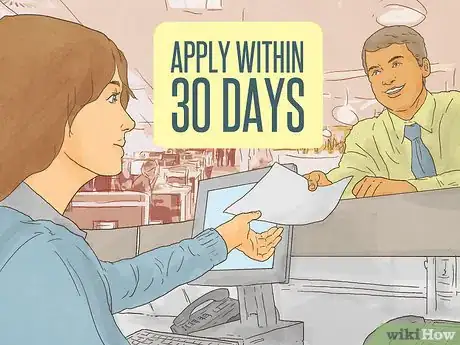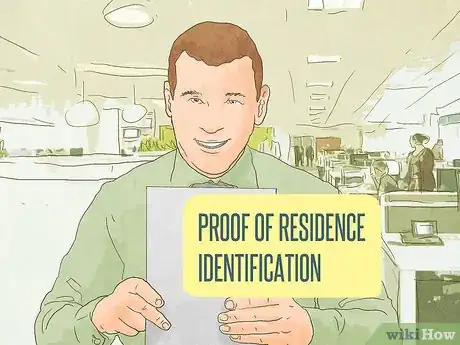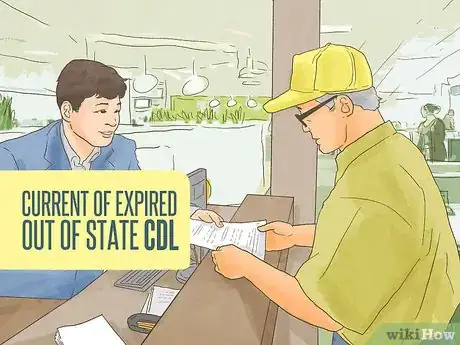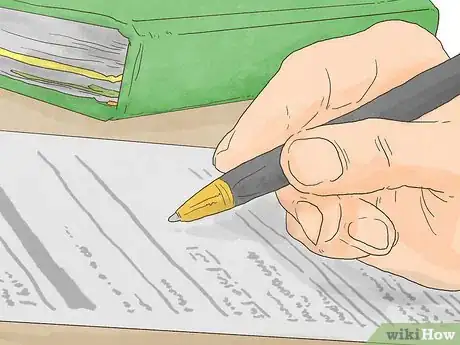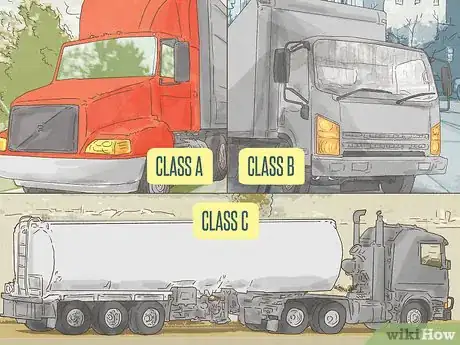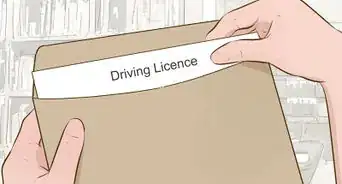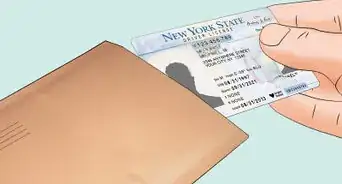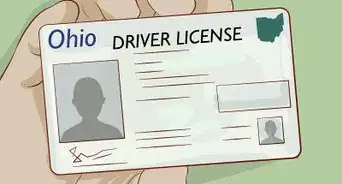This article was co-authored by Clinton M. Sandvick, JD, PhD. Clinton M. Sandvick worked as a civil litigator in California for over 7 years. He received his JD from the University of Wisconsin-Madison in 1998 and his PhD in American History from the University of Oregon in 2013.
There are 8 references cited in this article, which can be found at the bottom of the page.
wikiHow marks an article as reader-approved once it receives enough positive feedback. In this case, 82% of readers who voted found the article helpful, earning it our reader-approved status.
This article has been viewed 100,141 times.
To receive a commercial driver’s license (CDL) in the state of Georgia, you can transfer your current commercial license from out-of-state or obtain a learner's permit. All applicants must complete a commercial driver's license application and pay the required fees. First-time commercial drivers must also pass the written knowledge and driving skills tests. If you are moving to Georgia from out of the state, you must transfer your commercial drivers license to the state of Georgia within 30 days.
Steps
Getting a New CDL in Georgia
-
1Obtain a commercial driver’s license manual. The Georgia CDL Manual is available online[1] or at any Georgia Department of Driver Services (DDS) office.
- To find the nearest DDS office, visit the DDS website at www.dds.ga.gov and use the search feature to “Find a DDS Location Near You.” If you do not have Internet access, call the DDS Contact Center at (678) 413-8400.[2]
-
2Gather the required personal documents. The DDS will require you to present original forms of documents to show your identification and proof of residence.[3]
- current driver’s license, identification card, or commercial drivers license from another state
- Social Security Card or a document from the Social Security Administration that states you are not eligible to receive an SSN due to alien status
- two items that show proof of residence in the state of Georgia. Acceptable documents include a lease or rental contract, utility bills or bank statements issued within the last 60 days, or a pay stub that displays your name and address.
- proof of identity such as your birth certificate, passport, military identification card, marriage license, immigration identification card, or other proof of United States citizenship
Advertisement -
3Take the documents to any DDS office location. During your visit, you will be required to complete the commercial drivers license application and pay required fees.
-
4Pay the required fees. The application fee is $35, and the permit fee is an additional $10. If you pass the exams, the $10 pays for the instructional permit. If not, the $10 is retained as a testing fee, and an additional $10 will have to be paid the next time that you attempt the test.
-
5Take the written knowledge test. The written knowledge test is a requirement for obtaining a CDL, except for those drivers who are transferring a CDL from another state.
- The written knowledge test is available at every DDS office location. Examination stations are open Tuesday through Saturday, from 8:00 a.m. to 6:00 p.m. The latest time to begin a written knowledge test is 5:15 p.m.
- After passing the written knowledge test, you will receive your CDL permit.
-
6Schedule a driving skills test. Visit any DDS office to make an appointment in person or call the Customer Contact Center at 678-413-8400, between 7:00 a.m. and 5:15 p.m., Monday through Friday. You can schedule appointments up to 90 days in advance. The Customer Contact Center can schedule road tests for any of the available stations in the state. The latest test of the day will be schedule about 90 minutes before the closing time for the office.
- The commercial road tests are offered only at the service centers at Albany, Between, Cumming, Dalton, Gainesville, Jackson, Milledgeville and Thomson.
- You will be required to pay the road test fee of 50 dollars when you make the appointment. Fees for appointments made over the telephone can be paid with a credit card; however, for all other payment methods, you must visit an office in person.
-
7Attend your skills test appointment. The skills test will test your knowledge regarding inspection of your commercial vehicle, your knowledge regarding use of the controls on your vehicle, and will test your ability to drive and manage your vehicle on the road.[4]
-
8Receive your CDL. You will be issued your Georgia commercial drivers license after you have passed the driving skills test.
Transferring a CDL from Another State
-
1
-
2Prepare the required documents. You will need to have the following items to demonstrate your identification:[7]
- a birth certificate or U.S. Passport
- two items that link your name and residential address in Georgia, such as utility bills or bank statements.
- Social Security card or U.S. Passport
- documentation to show proof of name change, if applicable, such as a marriage license
-
3Submit your out-of-state CDL. This must be current, or expired within less than the past two years. If the out-of-state CDL is not available for any reason, you may submit a certified copy of your driving record or motor vehicle report from your previous state, which is dated within the past 30 days prior to your application.[8]
-
4Pay the application fees. The application fee is $35, and the license fee, when issued, is $20. Additional endorsements are $5 each.[9]
-
5Pass a vision exam. This will take place at the Department of Driver Services office where you go to submit your application.
-
6Certify your driving category and prior endorsements. If you wish to transfer the endorsement for transporting hazardous material, you will need to take and pass a Hazardous Material Knowledge Test.[10]
-
7Provide medical certification or waivers, if required. The medical certification or waivers do not apply to all drivers. To learn if you need these, you will need to review the CDL Medical Certification Process. This is available at https://dds.georgia.gov/cdl-med-cert?con=1744171759&ty=com.
Deciding Which “Class” CDL and Endorsements You Need
-
1Review the Georgia CDL definitions. In Georgia, the CDL requirements are broken into different classes, based on the size and purpose of the vehicle you will be driving. You will want to be familiar with the three different classes and their applications, so you will know what to apply for.[11]
- Class A is for a combination vehicle (cab and trailer) with a combined weight rating of 26,000 pounds, and that is capable of towing a unit over 10,000 pounds.
- Class B is for a single vehicle (non-towing) with a gross vehicle weight rating of over 26,000 pounds.
- Class C is for a vehicle designed to carry 16 or more passengers, or for a vehicle that transports hazardous materials.
- If none of these apply, then a CDL is not required.
-
2Be aware of CDL exemptions. There are certain circumstances in which a CDL is not required in Georgia. These exemptions include the following:[12]
- Recreational vehicles used for personal use.
- Military vehicles
- Emergency vehicles
- Farm vehicles, which are not used for hire or not driven more than 150 miles from the farm.
-
3Consider adding special endorsements. In addition to obtaining the correct CDL, a driver may obtain and qualify for certain endorsements. There are five separate endorsements that a driver may obtain:[13]
- The “T” endorsement is for drivers who will be driving double or triple trailers
- The “P” endorsement is for drivers who will be transporting 16 or more passengers.
- The “N” Tanker endorsement is for certain vehicles that will be transporting liquids or gases.
- The “H” endorsement is for transporting hazardous materials.
- The “X” endorsement is a combination of the hazardous materials (H) and tanker (N).
- Each of the endorsements, along with a description of what you will need to demonstrate to qualify, is described in more detail in the Georgia Commercial Drivers Manual.[14]
- Adding an endorsement to your CDL carries an additional fee, due at the time of application, of $5.[15]
References
- ↑ http://www.eregulations.com/georgia/commercial/
- ↑ http://www.dds.ga.gov/aboutus/contactus.aspx
- ↑ https://dds.georgia.gov/SecureID
- ↑ http://www.eregulations.com/georgia/commercial/basic-vehicle-control-skills-test/
- ↑ https://dds.georgia.gov/transfer-out-state-commercial-drivers-license
- ↑ https://dds.georgia.gov/fees-and-terms/fees-and-terms
- ↑ https://dds.georgia.gov/SecureID
- ↑ https://dds.georgia.gov/transfer-out-state-commercial-drivers-license
- ↑ https://dds.georgia.gov/fees-and-terms/fees-and-terms
- ↑ https://dds.georgia.gov/transfer-out-state-commercial-drivers-license
- ↑ https://dps.georgia.gov/sites/dps.georgia.gov/files/related_files/site_page/23%20-%20GA%20Commercial%20Drivers'%20Licenses.pdf
- ↑ https://dps.georgia.gov/sites/dps.georgia.gov/files/related_files/site_page/23%20-%20GA%20Commercial%20Drivers'%20Licenses.pdf
- ↑ https://dps.georgia.gov/sites/dps.georgia.gov/files/related_files/site_page/23%20-%20GA%20Commercial%20Drivers'%20Licenses.pdf
- ↑ http://www.eregulations.com/georgia/commercial/
- ↑ https://dds.georgia.gov/fees-and-terms/fees-and-terms
- ↑ https://dds.georgia.gov/certified-cdl-training-school








